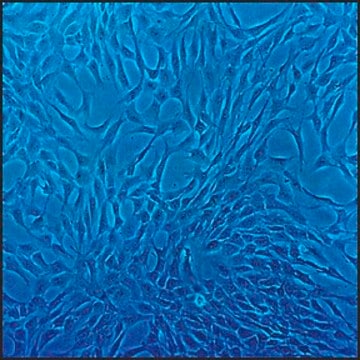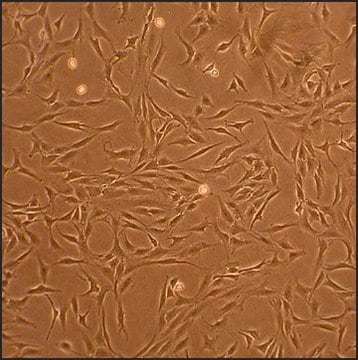About This Item
Código UNSPSC:
41106514
NACRES:
NA.81
Produtos recomendados
fonte biológica
human articular cartilage
Nível de qualidade
embalagem
pkg of 500,000 cells
fabricante/nome comercial
Cell Applications, Inc
modo de crescimento
Adherent
cariótipo
2n = 46
morfologia
chondrocyte
técnica(s)
cell culture | mammalian: suitable
doença(s) relevante(s)
arthritis
Condições de expedição
dry ice
temperatura de armazenamento
−196°C
Descrição geral
Lot specific orders are not able to be placed through the web. Contact your local sales rep for more details.
Human Chondrocytes, HC, are derived from normal human articular cartilage where they produce and maintain the extracellular matrix of cartilage, including type II collagen. Chondrocytes grown in monolayer culture on a solid surface tend to lose their phenotypic markers and became de-differentiated to a fibroblast-like phenotype. This de-differentiation stage can be reversed by culturing them in a semi-solid gel.
Normal Chondrocytes obtained from Cell Applications, Inc. have been adapted as an in vitro model system in multiple studies looking for cellular mechanisms, such as inflammation-related signaling cascades, abnormal proteinase production, chondrocyte apoptosis and differentiation, as well as novel potential treatments for arthritic disease.
Characterization: Positive for aggrecan after differentiation.
Normal Human Chondrocytes (HC) have been used to:
Normal Chondrocytes were also utilized in a functional cluster formation agarose assay that allows chondrocytes to maintain their differentiated state (Quintavalla, 2005) and to investigate integrin-mediated mechanotransduction pathways required for proper chondrocyte function (Whitney, 2012). Additionally, they have used extensively in material studies aimed to improve chondrocyte adhesion to medical implants (Gutwein, 2002; Ellison, 2003; Price, 2004; Savaiano, 2004; Burns, 2009) and scaffolds for cartilage regeneration (Jun, 2002; Kay, 2002; Miller, 2002a,b; Price, 2002, 2003; Rao, 2004; Park, 2005; Khang, 2008). Normal chondrocyte RNA was used as a gold standard control in research on cellular reprogramming into chondrocytes (Ishii, 2012).
Human Chondrocytes, HC, are derived from normal human articular cartilage where they produce and maintain the extracellular matrix of cartilage, including type II collagen. Chondrocytes grown in monolayer culture on a solid surface tend to lose their phenotypic markers and became de-differentiated to a fibroblast-like phenotype. This de-differentiation stage can be reversed by culturing them in a semi-solid gel.
Normal Chondrocytes obtained from Cell Applications, Inc. have been adapted as an in vitro model system in multiple studies looking for cellular mechanisms, such as inflammation-related signaling cascades, abnormal proteinase production, chondrocyte apoptosis and differentiation, as well as novel potential treatments for arthritic disease.
Characterization: Positive for aggrecan after differentiation.
Normal Human Chondrocytes (HC) have been used to:
- Develop a high throughput assay to screen for genes capable of inducing an OA-like phenotype in chondrocytes in order to identify key pathways implicated in the disease (Daouti, 2005)
- Elucidate the signaling cascade leading to induction of proinflammatory cytokines by chondrocytes in RA joints (Aida, 2006; Wang, 2011a,b) and effects of elevated IL-6 signaling on normal chondrocytes (Namba, 2007)
- Investigate mechanisms and identify inhibitors of increased production of proteinases by chondrocytes stimulated by interleukin-1 (Aida, 2005; Wada, 2006), retinoic acid (Hikichi, 2009), proinflammatory cytokines (Tanigawa, 2011a,b), nitric oxide (Wu, 2007; Yang, 2011) and shear stress (Wang, 2011b, 2012);
- Investigate the causes of metalloproteinases induction in patients with Lyme disease-associated arthritis (Lin, 2001; Behera, 2004, 2005)
- Study the factors affecting chondrocyte apoptosis (Cherng, 2008; Malemud, 2012) and differentiation into osteoclasts (Watanabe, 2009a,b; Honda, 2011)
- Show that hyaluronate (HA) can prevent the aggravated cartilage degradation by blocking the matrix metalloproteinases production from cytokine-activated chondrocytes via MKP-1 induction through CD44 signaling (Hashizume, 2009, 2010)
- Demonstrate cytotoxic effects of anti-human Fas/APO-1/CD95 (Fas) monoclonal antibody ARG098 on RA synoviocytes and infiltrating lymphocytes, but not on normal chondrocytes (Tamburstuen, 2010)
Normal Chondrocytes were also utilized in a functional cluster formation agarose assay that allows chondrocytes to maintain their differentiated state (Quintavalla, 2005) and to investigate integrin-mediated mechanotransduction pathways required for proper chondrocyte function (Whitney, 2012). Additionally, they have used extensively in material studies aimed to improve chondrocyte adhesion to medical implants (Gutwein, 2002; Ellison, 2003; Price, 2004; Savaiano, 2004; Burns, 2009) and scaffolds for cartilage regeneration (Jun, 2002; Kay, 2002; Miller, 2002a,b; Price, 2002, 2003; Rao, 2004; Park, 2005; Khang, 2008). Normal chondrocyte RNA was used as a gold standard control in research on cellular reprogramming into chondrocytes (Ishii, 2012).
Origem de linhagem celular
Cartilage
Aplicação
production and maintenance of extracellular matrix, cartilage, collagen, differentiation and de-differentiation, signal transduction, apoptosis, differentiation, drug screening, gene expression, cytokine production, agarose assays, chondrocyte adhesion to medical implants, scaffolds for cartilage regeneration
Componentes
Basal Medium containing 10% FBS & 10% DMSO
Nota de preparo
- 2nd passage, >500,000 cells in Basal Medium containing 10% FBS & 10% DMSO
- Can be cultured at least 10 doublings
Rotina de subcultura
Please refer to the HC Culture Protocol.
Exoneração de responsabilidade
RESEARCH USE ONLY. This product is regulated in France when intended to be used for scientific purposes, including for import and export activities (Article L 1211-1 paragraph 2 of the Public Health Code). The purchaser (i.e. enduser) is required to obtain an import authorization from the France Ministry of Research referred in the Article L1245-5-1 II. of Public Health Code. By ordering this product, you are confirming that you have obtained the proper import authorization.
Código de classe de armazenamento
11 - Combustible Solids
Classe de risco de água (WGK)
WGK 1
Ponto de fulgor (°F)
Not applicable
Ponto de fulgor (°C)
Not applicable
Certificados de análise (COA)
Busque Certificados de análise (COA) digitando o Número do Lote do produto. Os números de lote e remessa podem ser encontrados no rótulo de um produto após a palavra “Lot” ou “Batch”.
Já possui este produto?
Encontre a documentação dos produtos que você adquiriu recentemente na biblioteca de documentos.
Os clientes também visualizaram
Protocolos
Cryovial handling precautions prevent injuries from liquid nitrogen bursts.
Nossa equipe de cientistas tem experiência em todas as áreas de pesquisa, incluindo Life Sciences, ciência de materiais, síntese química, cromatografia, química analítica e muitas outras.
Entre em contato com a assistência técnica










